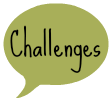Historical linguists have noticed something striking about how the meanings of words change over time: abstract words (words denoting a concept that can't be detected by the senses) always develop from earlier concrete meanings, not the other way around.
Continued after the jump...
Let's look at some English examples:
- Time: originally 'a division, cut-up piece' in Proto-Indo-European (ancestor of most European languages)
- Idea: from Greek, 'form, appearance, kind'
- Smart: in Old English, 'painful, stinging' (as in "ouch, that smarts!")
- Law: from Old Norse, 'something laid down or fixed'
- Angry: in Proto-Germanic, 'tight, narrow, painful'
- Want: derived from Proto-Indo-European 'leave, abandon' (because something you want is something you're lacking)
- Humor: from Latin, 'bodily fluid'
- Suggest: from Latin, 'bring up, lay beneath'
- Thrill: in Old English, 'pierce' (related to nostril)
- Abstract: from Latin, 'drawn away'
But how do concrete words become abstract? A word's meaning can't totally change overnight, or everyone would get confused. The answer is metaphor!
You probably remember from high school that a metaphor is a way of describing one concept by linking it to a different concept, like the guy on the left is doing. Authors and poets use metaphor to create vivid and original imagery in the reader's mind. But we everyday humans use metaphor constantly too!
Take this perfectly ordinary paragraph (which I've grabbed from Guy Deutscher's The Unfolding of Language), in which all the metaphorical words and phrases are in bold:
At the cabinet meeting, ground-breaking plans were put forward by the minister for tough new legislation to curb the power of the unions. It was clear that the unions would never go along with these suggestions, and the conflict erupted as soon as news of the plan was leaked to the press. At the trade-union conference, the minister encountered a frosty reception. He tried to get across the idea that the excessive power of the unions was holding back economic growth. He said that while productivity had sunk in recent years, salaries were rising. But his comments were drowned by angry heckling.All the bolded words have concrete meanings ("ground-breaking" is normally done with a shovel, something "clear" is see-through...), but they're being used in an abstract sense in this context. Since we all know the concrete meanings of these words, we can understand what's going on when they're used metaphorically. Over time, a word's original concrete meaning can start to fade away, leaving only the metaphorical sense behind; that's how we end up with abstract words like the ones in my list.
What's even more interesting is that the metaphors we use aren't independent of each other, but group together in clusters of meaning. These clusters of metaphors shape (and are shaped by) the way we think about the world. Here are some examples:
- Ideas = food. You can devour, swallow, digest, or chew on a piece of information, then regurgitate it back up on the final exam. Food for thought!
- Time = space. Time can be long or short. It can pass quickly or slowly. You can do something on Saturday, in February, at noon.
- More = up, less = down. Prices rise and fall, you can turn up the heat, your self-esteem can be low.
- Gonna. This word, of course, is originally a contraction of going to, which, of course, originally meant 'moving toward'. Now, it's used as a grammatical marker of the future tense. I'm gonna think about it means 'I will think about it in the future', not 'I'm going to a place to think about it'. Notice that you can't say gonna if you mean 'moving toward': *I'm gonna the grocery store. That's how we know gonna is a grammatical word.
If you extrapolate all these ideas back in time, you can imagine that the very first form of human language would have had nothing but words for concrete objects and actions. Those kinds of words would have been pretty crucial for early humans ("Lion!!"). Words for abstract ideas and grammatical bits and pieces would have cropped up later on, maybe in conjunction with evolutionary increases in human intelligence. (This is speculation, since the evolution of language is basically still a huge mystery!)
If you found this post interesting, here are a couple books you might enjoy: Guy Deutscher, The Unfolding of Language
(Psst...can you find all the metaphors in this post?)








Well although I don't have much to say about it, I really like your linguist posts :) I'm a technical writer, so little idiosyncrasies of the English language always interest me. I'm rarely allowed to use them (uniformity and repetitiveness are valued in technical documents) but I enjoy them.
ReplyDelete